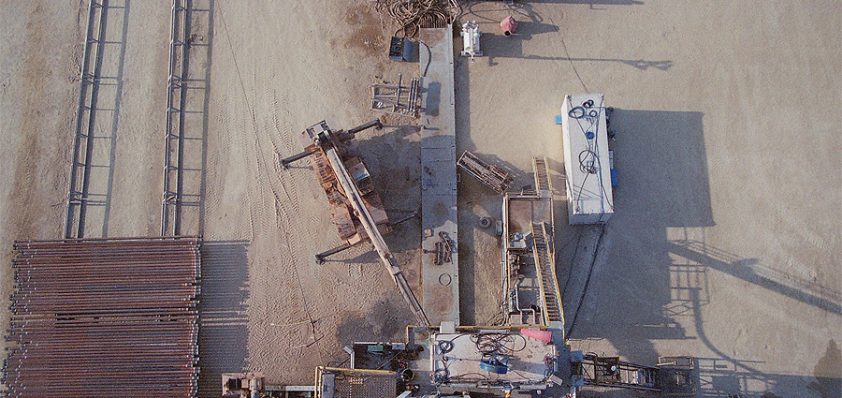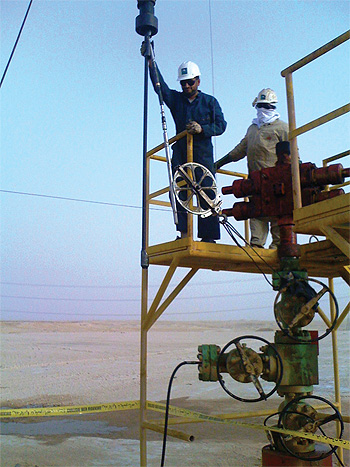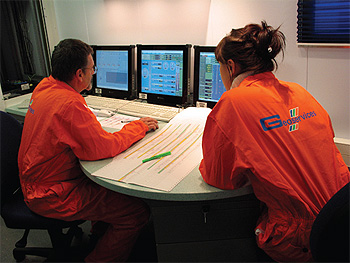
Geoservices
Well oiled operation
As an upstream oilfield service company, Geoservices evaluates hydrocarbon reservoirs and optimises field exploration, development and production.
The business operates on a global scale, pushing the boundaries in terms of technological breakthroughs in its three business segments and employing over 5000 personnel in 53 countries. Boasting a client base that includes international and national oil companies, as well as regional and multi-regional players, Geoservices occupies the world number one and number two positions in mud logging and well intervention respectively.

Lee Cockram, country manager for Geoservices’ in the UK, the Netherlands, Denmark, Germany and Russia, outlines the organisation’s remit: “As our primary focus is on the upstream sector, our main customers are oil companies, like Total, Shell, ExxonMobil and Chevron. Geoservices started 51 years ago as a mud logging company, based in Paris. Over the years the focus has changed slightly, and so the main services we provide at present are well intervention services, field surveillance operations and maintenance work, and mud logging – with the latter being our most important activity.”
Geoservices’ unique approach to mud logging and its proven competence in formation evaluation and drilling support has led it to its world leading position in this specialised market. It considers people to be key and, through technological development and training, Geoservices provides engineers with the right tools and techniques. Today many aspects of engineering and earth sciences are used to present a detailed picture of the drilling process and the subsurface environment, requiring two to four people at the wellsite, a mobile laboratory unit and a choice of sophisticated data acquisition systems. The logging unit is an information hub at the wellsite, which supplies information on the drilling process in real time to the relevant parties on site or at any remote location.
Research is an important element of Geoservices’ undertakings because, in the competitive oil services sector, having a technological advantage over rivals is the best way to maintain an industry leading position. Accordingly, Geoservices employs 100 researchers to investigate a variety of subjects, such as signal processing, nuclear physics, physico-chemistry, as well as purely technological problem solving. “Setting us apart from everybody else is the fact we invest up to and above three per cent of our total turnover revenue every year in R&D, developing our products so that we are better able to meet our customers’ needs,” Lee reveals. “For instance, we have just launched a new service line called isotope logging in real time.”
Geoservices’ isotope logging service helps customers to delineate reservoir structures and perform well-to-well correlations by providing continuous data in real-time. This allows the correlation of the intersected reservoirs and their evaluation in terms of reservoir compartmentalisation, without downhole sampling.
Geoservices’ researchers’ work is project led, following an idea from theoretical development to testing in real wells, and the teams’ hands-on, dynamic R&D strategies enable Geoservices to introduce more new services to the market than any of its direct competitors.
“Work takes place in our two major R&D centres,” Lee continues, describing Geoservices’ research capabilities. “Our Paris centre is mainly concerned with the mud logging and fluid analysis sides of the business while our site in Jakarta concentrates on well intervention. There have actually been a lot of recent developments related to well intervention.”
Geoservices’ proficiency in new product development stands it in excellent stead with regards to growth, although industry progression has not been significant in recent months, as Lee elaborates: “We’re always looking to expand in any area where we see potential for growth, but Geoservices works across the majority of the world already, so there are aren’t many regions that we’re not  active in – it’s just a case of securing more work within our active regions. The industry is looking very flat at the moment; there are certain parts of the world where we’re still growing and expanding but there are other parts, such as the North Sea, that are rather uneventful currently. There’s no expansion but there’s very little contraction of the company, so overall Geoservices is still growing.”
active in – it’s just a case of securing more work within our active regions. The industry is looking very flat at the moment; there are certain parts of the world where we’re still growing and expanding but there are other parts, such as the North Sea, that are rather uneventful currently. There’s no expansion but there’s very little contraction of the company, so overall Geoservices is still growing.”
In order to overcome the challenges presented by the recession, Geoservices is ensuring its services continue being offered at the high level customers have come to expect, in terms of quality. Lee explains: “The economic crisis is the major challenge at the moment, with the resulting competition between service companies in the industry being secondary. Issues of quality of work are central; we have to provide the best we can and we are the world leader in mud logging, so our name precedes us in a lot of areas. We have a reputation to uphold and our high standard of service is carrying us through the financial crisis.”
Clearly, Geoservices remains committed to its aim to lead its market segments by introducing technological breakthroughs and pushing operational excellence. As an organisation passionately committed to innovation in all areas of its activities, the business prides itself on its creativity and agility.
Lee shares his thoughts on the business’ progression and what the future holds for Geoservices: “As the world’s number one in mud logging, we’re looking to become the worldwide leader in well intervention as well, through our new technologies. Similarly, we’re going to further develop the mud logging side of the business through the use of new technologies and the inventions we’re creating, in terms of drilling and appraising wells.”
Geoservices
Services: Mud logging, well intervention and field surveillance